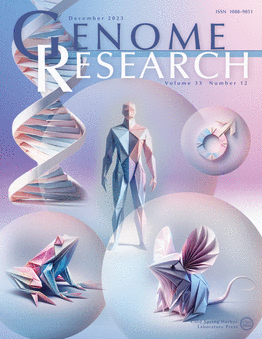小鼠胚胎发育过程中的多条件和多模态时间分布推断
IF 5.5
2区 生物学
Q1 BIOCHEMISTRY & MOLECULAR BIOLOGY
引用次数: 0
摘要
单细胞时间序列数据集的出现使各种类型的细胞剖面随时间变化的建模成为可能。然而,由于单细胞测量的破坏性,不可能捕获特定细胞的完整时间轨迹。此外,可以在不同条件(例如,性别、批次、疾病)和数据模式(例如,scRNA-seq, scATAC-seq)的不匹配时间点收集单细胞谱,这使得建模具有挑战性。在这里,我们提出了一个联合建模框架,Sunbear,用于整合多条件和多模态的单细胞剖面。Sunbear可用于估算单细胞时间剖面变化,调整多数据集和多模态剖面,并在缺失的模态中推断单细胞剖面。我们使用Sunbear来揭示小鼠胚胎发育过程中的性别偏向转录,并预测在多模态谱不可用的细胞中表观遗传启动和转录之间的动态关系。因此,Sunbear能够将单细胞时间序列快照投射到细胞轨迹的多模式和多条件视图中。本文章由计算机程序翻译,如有差异,请以英文原文为准。
Multicondition and multimodal temporal profile inference during mouse embryonic development
The emergence of single-cell time-series datasets enables modeling of changes in various types of cellular profiles over time. However, due to the disruptive nature of single-cell measurements, it is impossible to capture the full temporal trajectory of a particular cell. Furthermore, single-cell profiles can be collected at mismatched time points across different conditions (e.g., sex, batch, disease) and data modalities (e.g., scRNA-seq, scATAC-seq), which makes modeling challenging. Here we propose a joint modeling framework, Sunbear, for integrating multicondition and multimodal single-cell profiles across time. Sunbear can be used to impute single-cell temporal profile changes, align multidataset and multimodal profiles across time, and extrapolate single-cell profiles in a missing modality. We applied Sunbear to reveal sex-biased transcription during mouse embryonic development and predict dynamic relationships between epigenetic priming and transcription for cells in which multimodal profiles are unavailable. Sunbear thus enables the projection of single-cell time-series snapshots to multimodal and multicondition views of cellular trajectories.
求助全文
通过发布文献求助,成功后即可免费获取论文全文。
去求助
来源期刊

Genome research
生物-生化与分子生物学
CiteScore
12.40
自引率
1.40%
发文量
140
审稿时长
6 months
期刊介绍:
Launched in 1995, Genome Research is an international, continuously published, peer-reviewed journal that focuses on research that provides novel insights into the genome biology of all organisms, including advances in genomic medicine.
Among the topics considered by the journal are genome structure and function, comparative genomics, molecular evolution, genome-scale quantitative and population genetics, proteomics, epigenomics, and systems biology. The journal also features exciting gene discoveries and reports of cutting-edge computational biology and high-throughput methodologies.
New data in these areas are published as research papers, or methods and resource reports that provide novel information on technologies or tools that will be of interest to a broad readership. Complete data sets are presented electronically on the journal''s web site where appropriate. The journal also provides Reviews, Perspectives, and Insight/Outlook articles, which present commentary on the latest advances published both here and elsewhere, placing such progress in its broader biological context.
 求助内容:
求助内容: 应助结果提醒方式:
应助结果提醒方式:


